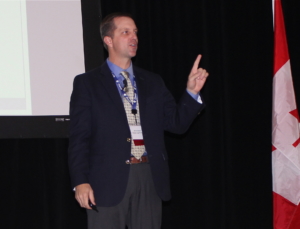Those words have become a status symbol in Japan and music to the cash registers of Canadian pork producers. 01
01
“Verified Canadian Pork (VCP) is not just a logo with a word on it,” Greg Giokas, president of Canada Pork International (CPI), told those attending the Saskatchewan Pork Industry Symposium. “In Japan, they are asking for this logo on the product. Dealing with the Japanese market, you are dealing with consumers who are obsessed by quality in everything they do. It’s cultural. It’s not taught. It’s ingrained. They will pay for quality and they appreciate it. Not only that, they expect it.
“We can’t compete as a commodity with large plants in the U.S. and the EU, but we have to distinguish ourselves. What we use is quality and what the market responds to is quality. We get a premium, but we also get a stable long-term relationship based on the ability to provide what the customer wants and what will make the distributor and retailer money.”
Giokas said CPI is a lean organization staff-wise, but continues to get the job done for Canadian producers.
“We are quite successful with what we have and this is the reason. We are part of a very powerful network and that is you in this room. The meat council and the pork council and all the provincial associations are the strength of this organization. We wouldn’t be able to do this with (our) five or six people, but we count on such a big and powerful and knowledgeable network.
“We need to keep reminding ourselves how important we are to the Canadian economy. We know that, you know that in your local communities, but we don’t get the recognition for it that we think we deserve.”
Giokas is new to CPI, having become its president in August, but not to international trade and relations. His resume includes being Canadian Consul General in Bangalore, India, and Canada’s High Commissioner in Pakistan. He also served in the Canadian Embassy in Japan, and in numerous roles related to international trade.
CPI has offices in Japan and China, where inroads continue to be made.
“China is the third biggest foreign market by value, but second by volume. We export mostly chilled product to Japan and get a high return, but the volume that goes to China is greater and is mostly frozen product. That should change in the future as we get some of our cold storage facilities approved.”
He said Canada’s historic wheat deals with China in the late 1960s continue to pay dividends. Trading partners have long memories. He said Prime Minister Justin Trudeau’s recent trip to China goes a long way in strengthening the relationship.
“They liked that. They had some things to tell us — mainly pay attention. So when we paid attention they reciprocated with a visit by their premier to Ottawa and what he said was very important. He said, ‘We see Canada as a model and we want to deal with you, we want to have a trade agreement with you because we see you as a model for how we will deal with the rest of the world.’
“It’s not a question of us engaging China, they are engaging us and they’re engaging us on trade issues which are of importance and interest to us particularly in this sector.” He said it is important that we mind the store at home.
“The domestic market is, of course, very important and you get good returns on the domestic market as well. We import about 200,000 tonnes from the U.S, so that’s competition in our market and you will see, with the upcoming trade agreement with the EU, we will have more competition with processed product in Canada.”
Canada will make inroads in Europe, gaining an extra 67,000 tonnes of product, he said. “We didn’t have this before and we will have it. This is additional and it’s an important market. We feel we could have done a lot better in this trade agreement, but we will take what we get and it’s pretty good.”
Without mentioning the name Donald Trump, Giokas said these will be interesting times in the trade agreement world.
“The U.S. will probably be entering a more protectionist era,” he said matter-of-factly.
Giokas said he expects to see the TPP scrapped. He refers to it in the past tense.
“The beauty of the TPP was it resolved all the pressure on NAFTA. NAFTA is an old agreement that doesn’t include what we have in more modern trade agreements. NAFTA is under a lot of pressure, legitimate pressure, not just protectionist pressure, to be modernized. TPP resolved that because Mexico, the U.S. and Chile were all in TPP. TPP was good for us.”
He said without the trade agreement, Canada will deal with countries such as Japan one on one.
“They really do see us as a reliable, trustworthy partner. We had for 10 years a logo that nobody ever asked for, but within four months (Japanese) retailers were requesting this logo on (our) product. When you see it on the shelf, it stands out. You can see the maple leaf, the check mark and it’s red and white.”
That means it is Verified Canadian Pork. •
— By Cam Hutchinson





